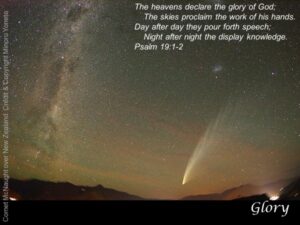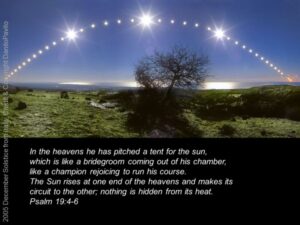A friend of mine is a professional physicist and astronomer and I have always enjoyed talking with her about astronomy as I have long been an amateur astronomy aficionado. If we are blessed enough to experience it, there is nothing quite so breathtaking as being far away from any sources of light pollution so as to be able to gaze up at the millions of stars in the sky above. Many of us have also thrilled in the last couple years to see the stunning photos that the James Webb telescope has taken of distant quasars, nebulae, and whole galaxies.
But I must say that in the midst of such experiences, never once have I said to someone or thought to myself, “You know, this all reminds me also of just how gorgeous God’s rules and laws are!” No, that’s just not a connection many of us would be likely to make. Somehow, however, this is exactly what occurred to the writer of Psalm 19. He leaps from six verses of rhapsodic celebrations of the physical universe and of our own sun as it marches through the sky every day to suddenly talking about how equally beautiful God’s Law is.
And it’s not as though the laws he has in mind are the laws of astrophysics or the teachings of an Isaac Newton sort of person that might have some connection to the beauties of the sun, moon, and stars. No, the rules he goes on to celebrate are God’s moral and civil laws. The psalmist used almost every Hebrew synonym for law that existed in ancient Hebrew: laws, rules, statutes, precepts, commands, decrees. They all shine brighter than gold, they are all sweeter than honey, they all make a person wise, they all open one’s eyes to see the world clearly. Then before Psalm 19 concludes, all that talk about the law led the writer to reflect on his failures in keeping God’s rules sometimes so he asks for forgiveness both for the sins he knows about and the ones even he is unaware of.
Maybe it’s some of that last part that led the Revised Common Lectionary to assign Psalm 19 for the third Sunday in Lent in the Year B cycle. I will comment more on that below but first let’s ponder more how the psalmist got from a celebration of how the physical universe witnesses to the grandeur of the Creator God to that same God’s many commands and rules.
It was noted above that it is not as though the laws the psalmist talks about are the laws of physics as that at least might connect the two parts of this poem. But maybe there was something about the orderliness of the observed universe—the reliable way the sun does its march across the sky day after day without fail—that led to the idea that there is also a moral orderliness to the world to which we need to pay attention. That might be a partial link here. We serve a God of cosmos not chaos, of order and not disorder. We can see this in the physical universe and we can see it in our lives just generally.
Indeed, we can thank God that there is reliability in the universe. We can get out of bed in the morning and put our feet on the floor and stand up knowing that we will not suddenly fall through the floor or discover that gravity has taken a day off and so we begin to float erratically around our bedroom. We rely on the stability of things like gravity more than we usually consciously ponder. Cause and effect works across scores of activities in which we engage every single day.
But this means that there is a proper ordering for other things as well in terms of human behavior. If we do a given thing the right way, flourishing and delight will result. But if we break the rules of God, harm will follow. We will get hurt. We will hurt others. How often haven’t we seen how a husband and father, for instance, who abuses his family psychologically or in other ways sets off a kind of bad momentum that tears people apart, sometimes even for generations to come.
The psalmist knew that God’s laws and commands are not arbitrary. God has given us these rules so they can function as a kind of Owner’s Manual for creation. Just as we consult an Owner’s Manual to know the precise steps we need to follow to make our kitchen stove or our smartphone to work properly, so we consult God’s rules in order that our entire lives can operate optimally.
It is no doubt a mark of our fallenness and brokenness that some of us regard the very idea of moral regulations as an intrusion on our personal freedom. Rules clip our wings, spoil our fun. We should be able to decide for ourselves what we want to do in any given area of life. Some people operate this way just generally but like the psalmist, we all must confess that we also sometimes act like we think this way. And so we need to confess. We need to ask God to keep us on the right path and to pick us up and dust us off when we fall down morally.
The God who made the splendors of the physical cosmos has our best interests at heart in all things. We know of this God’s grandeur from the witness of the heavens above and we know of this God’s love for us when we see how God has taken care to show us the path to follow if we want to experience the flourishing and delight that God intended for all of us when we were created in this God’s image.
[Note: In addition to our weekly sermon commentaries, we have a special resource page for Lent and Easter for you to explore!]
Illustration Idea
Colleague Deborah Haarsma is an astronomer and the President of BioLogos. Some years ago she and I made a presentation at a conference and I share here a couple PowerPoint slides she prepared that illustrate the wonders of the first part of Psalm 19. I particularly like the time lapse photo of the sun across the course of a day!


Sermon Commentary for Sunday, March 3, 2024
Psalm 19 Commentary